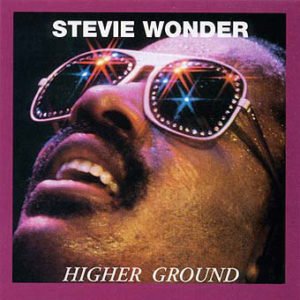October 16, 2020 —– Chart # 61
Hello Musical Friends,
It’s Saturday, time to enjoy the weekend. As electronics were being introduced to the music scene in the 60’s and 70’s there were lots of amazing players who showed us just what could be done. New sounds, tones and musical phrases that had never before been heard were all throughout music. Perhaps nothing changed music so abruptly as the synthesized sounds we heard from experimental keyboard companies such as EMS, Moog, ARP, Yamaha, Korg and others. Musicians and bands like Keith Emerson, Kraftwerk and YES gave us sounds that were energized and exciting.
“Higher Ground” is a funk song written by Stevie Wonder which first appeared on his 1973 album Innervisions. The song reached number 4 on the Billboard Hot 100 and number 1 on the US Hot R&B Singles chart. Wonder wrote and recorded the song in a three-hour burst of creativity in May 1973. The album version of the song contains an extra verse and runs 30 seconds longer than the single version. The unique wah-clavinet sound in the song was achieved with a Mu-Tron III envelope filter pedal. The bass line is provided by a Moog synthesizer and using overdubs, Wonder played all instruments on the track, including drums and percussion. The song was released in the UK but achieved only modest success, reaching number 29 in the UK Singles Chart.
The song lyrics address the issue of reincarnation. Wonder commented, when interviewed by The New York Times:
“I would like to believe in reincarnation. I would like to believe that there is another life. I think that sometimes your consciousness can happen on this earth a second time around. For me, I wrote “Higher Ground” even before the accident. But something must have been telling me that something was going to happen to make me aware of a lot of things and to get myself together. This is like my second chance for life, to do something or to do more, and to value the fact that I am alive.”
According to Billboard, the lyrics are about “people who are moving ahead in love and in all phases of life.”
In 2004, Rolling Stone ranked the song number 265 on its list of the 500 Greatest Songs of All Time, adding: “‘Higher Ground’ was recorded just before Wonder was involved in a near-fatal accident in August 1973 that left him in a coma. Early in Wonder’s recovery, his road manager sang the song’s melody into the singer’s ear; Wonder responded by moving his fingers with the music.” According to Acclaimed Music, it is the 515th most celebrated song in popular music history.
Stevland Hardaway Morris (born May 13, 1950, age 70), known professionally as Stevie Wonder, is an American singer, songwriter, musician and record producer. A virtual one-man band, his use of synthesizers and further electronic musical instruments during the 1970s reshaped the conventions of R&B. He also helped drive the genre into the album era, crafting his LPs as cohesive, consistent socially conscious statements with complex compositions. Wonder is often hailed as a “genius”, and has been credited as a pioneer and influence to musicians of various genres including rhythm and blues, pop, soul, gospel, funk and jazz.
Blind since shortly after his birth, Wonder was a child prodigy known as Little Stevie Wonder, leading him to sign with Motown’s Tamla label at the age of 11. In 1963, the single “Fingertips” was a number-one hit on the Billboard Hot 100 when Wonder was 13, making him the youngest artist ever to top the chart. Wonder’s critical success was at its peak in the 1970s. His “classic period” began in 1972 with the releases of Music of My Mind and Talking Book, the latter featuring “Superstition“, which is one of the most distinctive and famous examples of the sound of the Hohner Clavinet keyboard. His works Innervisions (1973), Fulfillingness’ First Finale (1974) and Songs in the Key of Life (1976, a personal favorite) all won the Grammy Award for Album of the Year, making him the tied-record holder for the most Album of the Year wins, with three. (Other three-time winners were Frank Sinatra and Paul Simon.) He is also the only artist to have won the award with three consecutive album releases.
Wonder has sold over 100 million records worldwide, making him one of the best-selling music artists of all time. He has won 25 Grammy Awards, making him the Grammy’s most awarded solo artist of all time. He was the first Motown artist and second African-American musician to win an Academy Award for Best Original Song, for the 1984 film The Woman in Red. Wonder has been inducted into the Rhythm and Blues Music Hall of Fame, Rock and Rock Hall of Fame and Songwriters Hall of Fame, and has received a star on the Hollywood Walk of Fame. He is also noted for his work as an activist for political causes, including his 1980 campaign to make Martin Luther King Jr.’s birthday a federal holiday in the United States. In 2009, he was named a United Nations Messenger of Peace. In 2014, he was honored with the Presidential Medal of Freedom.
Let’s face it, we are not all musicians with mastery of the electronic keyboards like Stevie Wonder. I chose to share this chart because you just might be surprised at how you can adapt it to your instrument and your band. This song has awesome punch, have fun with it.
Enjoy the original 1973 studio version:
Live performance in 1974. Check out this band:
Keep rockin’,
Stan
